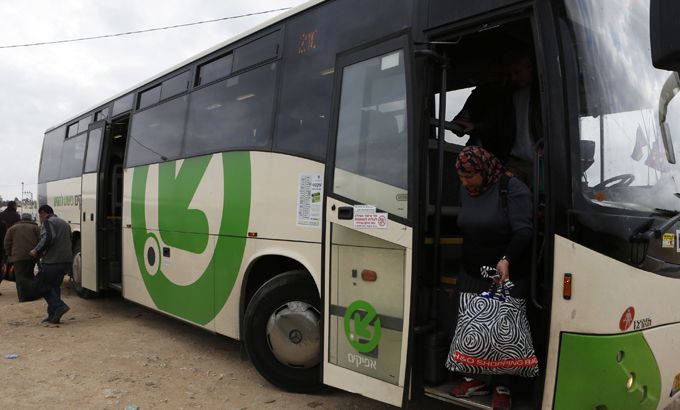
On the road to Israeli apartheid?
As Palestinians-only bus services spark a debate, we ask if it indicates an Israeli policy of systematic segregation.
Dedicated buses for Palestinian workers have triggered a renewed debate over segregation and inequality in Israel.
|
“This is just not the segregation of buses; we are talking about the segregation of roads which did not exist even in the worst time of apartheid South Africa or during the segregation times of the United States.“ – Mustafa Barghouti, Palestinian National Initiative |
Tens of thousands of Palestinians from the occupied West Bank commute daily to work in Israel but following complaints by West Bank settlers about sharing buses, the country’s transport ministry has introduced two new Palestinians-only bus services.
It says the new buses offer Palestinian commuters a cheaper alternative but critics have drawn parallels with the ‘separate but equal’ doctrine that was declared discriminatory by the US supreme court in the 1950s.
Although a number of Palestinian commuters have welcomed the move, however, the Palestinian Authority has not.
Human rights groups insist that Israel discriminates between Israelis and Palestinians.
“Creating separate bus lines for Israeli Jews and Palestinians is a revolting plan,” Jessica Montell, director of the B’Tselem rights group, said on Army Radio. “This is simply racism. Such a plan cannot be justified with claims of security needs or overcrowding.”
|
“It’s pretty rich for a defender of Israeli apartheid, like Mr Roman, to exploit the economic desperation of a colonised, occupied people …. Mr Roman probably doesn’t realise that he sounded very similar to the South African apartheid spokespersons in days gone by when he sort of praises the economic opportunities afforded by the benevolent colonial power to the occupied people. Palestinians … don’t want to be grateful for handouts … and shared industrial zones, they want their rights and they want their freedom.“ – Ben White, journalist and author |
- Israel’s Basic Law does not contain a commitment to equality for all before the law
- Activists say that Israel carries out a system of de facto segregation in the West Bank
- While Israeli settlements are allowed to expand, Palestinian construction permits are regularly denied without cause
- There are also two separate systems of education – one in Hebrew in predominantly Jewish municipalites, and one in Arabic in what are described as the “municipalities of the minorities”
- Israel also prevents Palestinians from holding Israeli citizenship and those living in the West Bank and in Gaza from being reunified – that stops someone from the West Bank for instance, marrying someone from Gaza.
Meanwhile, the transport ministry said the two new lines would “improve public transport services for Palestinian workers entering Israel” and replace pirate buses charging them “exorbitant prices”.
Inside Story, with presenter Mike Hanna, discusses with guests: Ben White, a journalist and the author of “Israeli Apartheid: A Beginner’s Guide“; Gregg Roman, director of the Jewish Community Relations Council of Pittsburgh, also a former political advisor to the Knesset and a former Israeli Ministry of Defence official; and Mustafa Barghouti from the Palestinian National Initiative and member of the Palestinian Legislative Council.
|
“To compare this system to apartheid discredits those individuals who suffered under the tyrannical South African regime and Jim Crow laws that took place in the South through the 1960s. In fact one of the ways that this system came about in order to come into place by having two separate bus lines was at the request of Palestinian workers who are trying to be able to spend more time with their families by having an easier, cheaper and faster alternative to get to work.” – Gregg Roman, Jewish Community Relations Council of Pittsburgh |